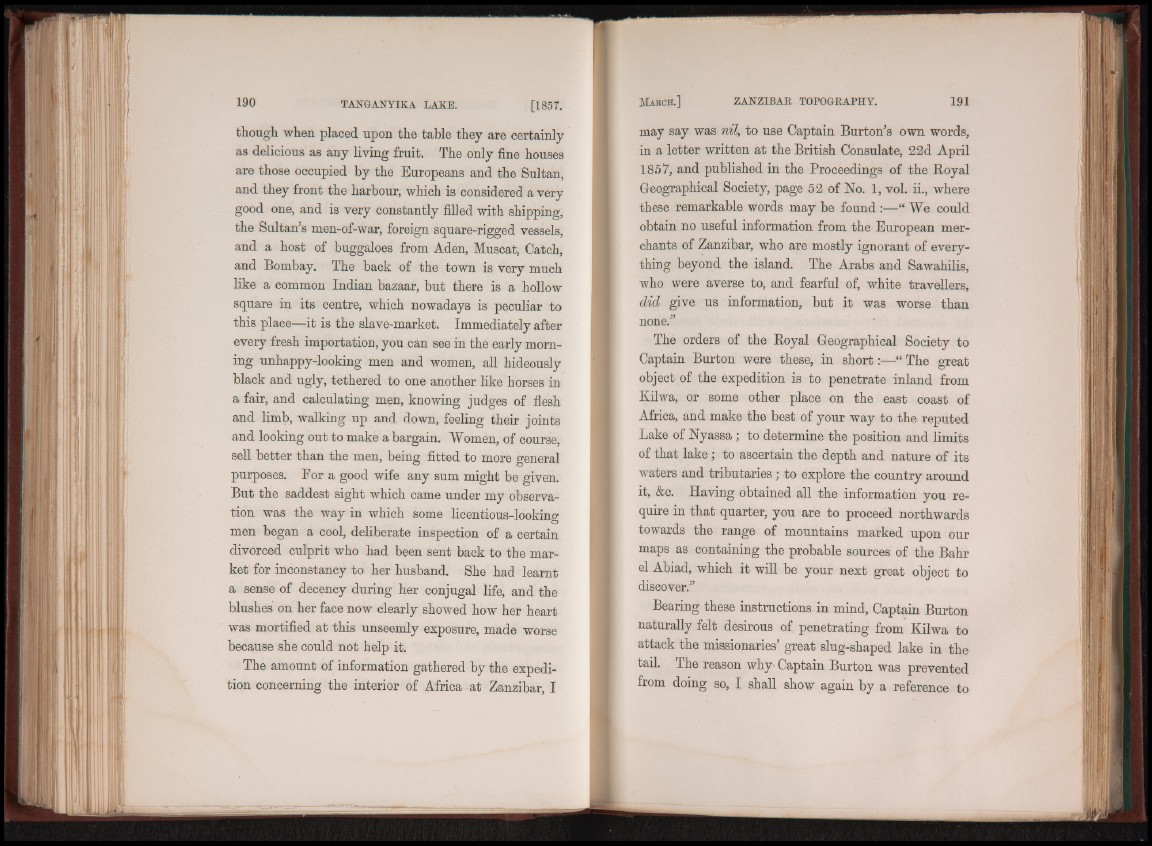
though, when placed upon the table they are certainly
as delicious as any living fruit. The only fine houses
are those occupied by the Europeans and the Sultan,
and they front the harbour, which is considered a very
good one, and is very constantly filled with shipping,
the Sultan’s men-of-war, foreign square-rigged vessels,
and a host of buggaloes from Aden, Muscat, Catch,
and Bombay. The back of the town is very much
like a common Indian bazaar, but there is a hollow
square in its centre, which nowadays is peculiar to
this place—it is the slave-market. Immediately after
every fresh importation, you can see in the early morning
unhappy-looking men and women, all hideously
black and ugly, tethered to one another like horses in
a fair, and calculating men, knowing judges of flesh
and limb, walking up and down, feeling their joints
and looking out to make a bargain. Women, of course,
sell better than the men, being fitted to more general
purposes. For a good wife any sum might be given.
But the saddest sight which came under my observation
was the way in which some licentious-looking
men began a cool, deliberate inspection of a certain
divorced culprit who had been sent back to the market
for inconstancy to her husband. She had learnt
a sense of decency during her conjugal life, and the
blushes on her face now clearly showed how her heart
was mortified at this unseemly exposure, made worse
because she could not help it.
The amount of information gathered by the expedition
concerning the interior of Africa at Zanzibar, I
may say was nil, to use Captain Burton’s own words,
in a letter written at the British Consulate, 22 d April
1857, and published in the Proceedings of the Royal
Geographical Society, page 52 of No. 1, vol. ii., where
these remarkable words may be found :—f We could
obtain no useful information from the European merchants
of Zanzibar, who are mostly ignorant of everything
beyond the island. The Arabs and Sawahilis,
who were averse to, and fearful of, white travellers,
did give us information, but it was worse than
none.”
The orders of the Royal Geographical Society to
Captain Burton were these, in sh o rt:—“ The great
object of the expedition is to penetrate inland from
Kilwa, or some other place on the east coast of
Africa, and make the best of your way to the reputed
Lake of Nyassa; to determine the position and limits
of that lake; to ascertain the depth and nature of its
waters and tributaries; to explore the country around
it, &c. Having obtained all the information you require
in that quarter, you are to proceed northwards
towards the range of mountains marked upon our
maps as containing the probable sources of the Bahr
el Abiad, which it will be your next great object to
discover.”
Bearing these instructions in mind, Captain Burton
naturally felt desirous of penetrating from Kilwa to
attack the missionaries’ great slug-shaped lake in the
tail. The reason why- Captain Burton was prevented
from doing so, I shall show again by a reference to